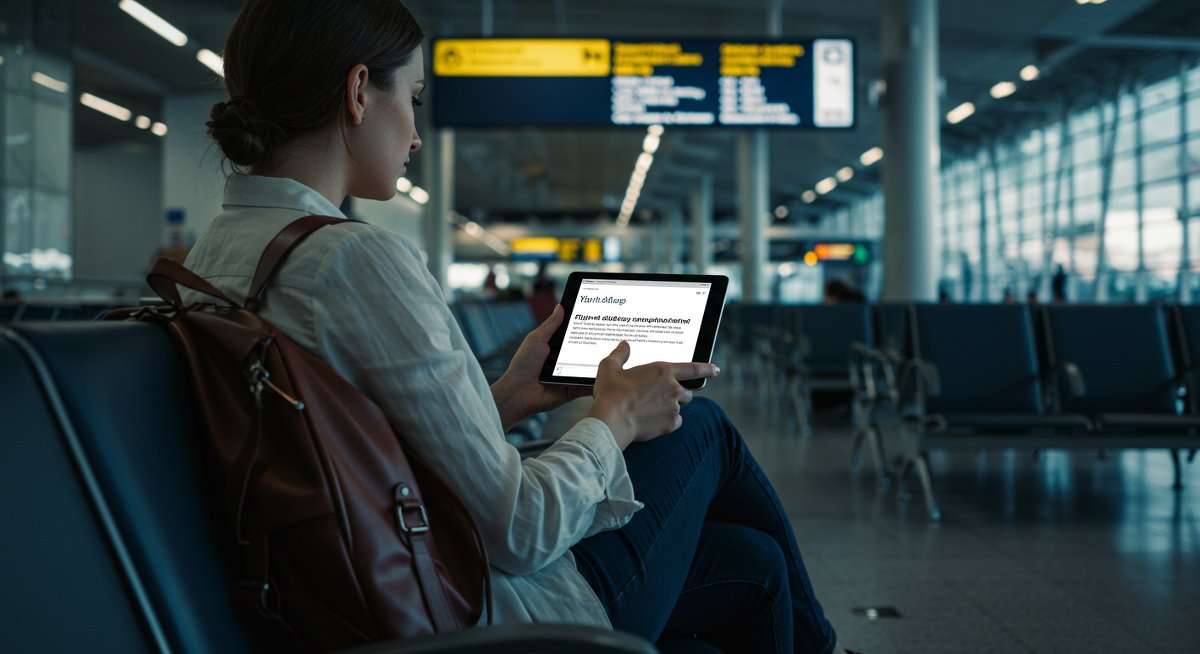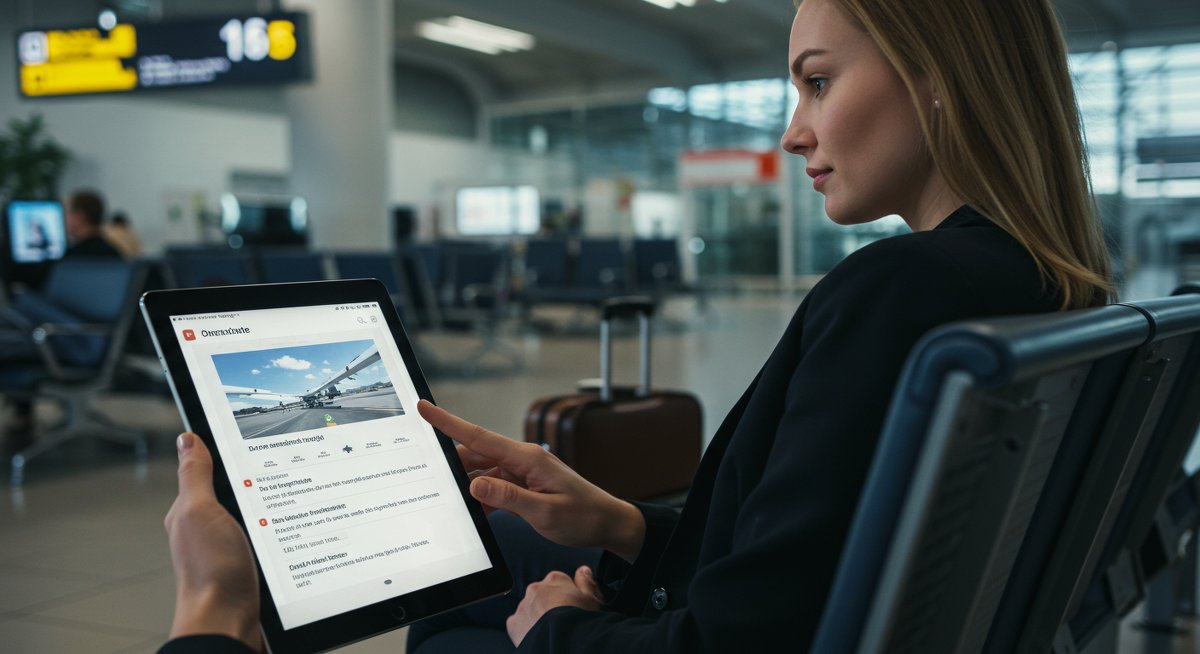Are you an experienced international traveler tired of flight delays disrupting your carefully planned trips? Flight delays are a frustrating reality, potentially costing you time, money, and peace of mind. This guide is designed specifically for you, providing an actionable framework to understand your rights, navigate the compensation process, and get the money you deserve when your international flight is delayed or canceled. We'll cut through the jargon and give you the tools you need to take control of your travel experiences.

The Problem: What's Really Happening
Flight delays and cancellations are a persistent issue. These disruptions stem from a variety of factors, including mechanical issues, weather, air traffic control problems, and even staffing shortages. For international travelers, the consequences are amplified. You face missed connections, lost hotel bookings, and the added stress of navigating unfamiliar regulations and time zones.
Here's a breakdown of what you need to know:
- Delayed Flights: Defined as flights that arrive at their final destination more than a certain number of hours after the scheduled arrival time. This threshold varies depending on the regulations of the region where the flight originated or is departing from.
- Canceled Flights: Flights that do not operate as scheduled.
- Overbooked Flights: Airlines sometimes sell more tickets than available seats, leading to passengers being denied boarding.
Example 1: The Impact of Delays
Imagine you're flying from London to Tokyo, and your connecting flight in Frankfurt is delayed by 6 hours due to a technical fault. This delay causes you to miss your onward connection, resulting in a missed hotel reservation, a day of lost sightseeing, and additional expenses for meals and accommodation in Frankfurt. Without compensation, these unexpected costs can significantly impact your travel budget.
Example 2: The Ripple Effect of Cancellations
You're on a business trip from New York to Singapore, and your flight is canceled due to severe weather conditions. You are rebooked on a flight departing the next day, but this causes you to miss a critical meeting, and you are forced to rearrange your schedule. The cancellation affects your business commitments and the potential for lost revenue.
Expert Tip: Always keep copies of your flight tickets, boarding passes, and any communication you have with the airline. These documents are crucial evidence when filing a compensation claim.
Why This Affects International Travelers
International travelers face unique challenges when dealing with flight disruptions.
- Complex Regulations: Different countries and regions have their own passenger rights regulations. Understanding these can be confusing, time-consuming, and frustrating.
- Language Barriers: Communicating with airlines in a foreign language can be difficult, especially during a stressful situation.
- Time Zone Differences: These can make it difficult to contact the airline and track the status of your claim.
- Legal Jurisdictions: Where your flight originated, where it landed, and the airline's home country can all affect your rights and the process for claiming compensation.
Example 1: Navigating EU Regulations
If your flight departs from or arrives in the European Union, you are protected under EU Regulation 261/2004. This regulation gives you specific rights, including the right to compensation for delays of more than three hours. The amount of compensation varies depending on the distance of the flight. For example, a flight over 3,500 km (2,175 miles) can be eligible for up to €600 (approximately $650 USD) in compensation.
Example 2: Dealing with Non-EU Regulations
If your flight is not covered by EU regulations, your rights will depend on the laws of the country where the flight originated or where the airline is based. In the United States, for example, airlines are not required to provide compensation for delays, but they must provide a refund if the flight is canceled. This is why it's so important to know your rights.
Common Mistakes:
- Not knowing your rights: Many travelers are unaware of their rights and, therefore, do not claim compensation.
- Giving up too easily: Airlines sometimes deny claims initially. Do not give up! You have a right to appeal.
- Missing deadlines: Each jurisdiction has its own deadline for filing a claim. Missing the deadline means losing your chance for compensation.
Step-by-Step Solution Framework
Here's a practical, step-by-step framework to help you claim compensation:
Step 1: Determine Eligibility
- Check if your flight is eligible for compensation. As a general rule, delays of more than three hours, cancellations, and overbooking are often eligible. The origin and destination of your flight, as well as the airline's location, matter.
- Consult the relevant regulations (e.g., EU 261/2004 if flying to/from EU, or other country-specific laws).
Step 2: Gather Documentation
- Collect all necessary documents. This includes your flight ticket, boarding pass, any communication with the airline, and any receipts for expenses incurred as a result of the delay or cancellation (hotel, meals, transportation).
- Take screenshots or photos of flight status updates and any announcements made by the airline.
Step 3: Contact the Airline
- Contact the airline directly. You can usually find the contact information on their website or in your booking confirmation.
- Write a formal claim, including all relevant details of your flight, the reason for the delay or cancellation, and the documentation you have gathered. Be clear and concise in your claim.
Step 4: Consider Using a Compensation Service (AirHelp is a great choice)
- If the airline denies your claim or if you are not comfortable navigating the process, consider using a flight compensation service like AirHelp.
- AirHelp handles the entire process for you, taking a percentage of the compensation if they win the case. This can be a stress-free option for complex international claims.
Step 5: Follow Up and Escalate if Necessary
- Follow up with the airline if you do not receive a response within a reasonable timeframe (e.g., 30-60 days).
- If the airline denies your claim, you can appeal their decision. If the airline continues to deny your claim, you can escalate the issue to the relevant authorities (e.g., the aviation authority in the country where the flight originated).
Example 1: Successfully Claiming Compensation
Imagine your flight from Paris to New York was delayed by 5 hours due to severe weather. Using the framework above, you first checked that you were eligible under EU 261/2004. Then, you gathered your boarding pass, ticket, and proof of the delay. You contacted the airline and, after providing the necessary documentation, received €400 (approximately $430 USD) in compensation.
Example 2: The Value of Professional Help
Your flight from Hong Kong to Vancouver was canceled due to mechanical issues, and the airline denied your claim, citing “extraordinary circumstances.” You were unsure of your rights, so you contacted AirHelp. AirHelp reviewed your case, and, after a lengthy process, secured $650 USD in compensation for you. This shows the value of professional help in complex claims.
Prevention Strategies
While you can't always prevent flight delays, you can take steps to minimize their impact and be better prepared.
- Choose Flights Strategically: Opt for direct flights whenever possible. Consider flights earlier in the day to reduce the risk of delays. Fly on weekdays, as weekends tend to have more delays.
- Travel Insurance: Purchase travel insurance that covers flight delays and cancellations. Check your policy to understand the specifics of coverage.
- Stay Informed: Download the airline's app or sign up for flight alerts to receive real-time updates on the status of your flight. Check flight trackers (e.g., FlightAware) for more comprehensive information.
- Pack Smart: Always pack essential medications, toiletries, and a change of clothes in your carry-on bag in case of unexpected delays.
Common Pitfalls:
- Relying solely on airline announcements: Airlines may not always provide complete or accurate information. Verify information from multiple sources.
- Ignoring travel advisories: Before you travel, check for any travel advisories that may impact your flight.
- Underestimating the impact of delays: Even a short delay can have a significant impact on your travel plans. Plan accordingly.

When to Seek Professional Help
Knowing when to seek professional assistance can make a big difference in the success of your claim.
- Denied Claims: If the airline denies your claim, consider seeking professional help to appeal the decision.
- Complex Cases: If your claim involves multiple airlines, different legal jurisdictions, or unusual circumstances, a professional service can navigate the complexities.
- Lack of Time: If you do not have the time or the desire to deal with the claim process, a service like AirHelp can manage it for you.
Example: The Benefit of Expert Legal Support
Imagine a scenario where your flight from Sydney to Los Angeles was overbooked, and you were denied boarding. The airline offered you a voucher, but you knew you were entitled to more. You consulted with AirHelp, who helped you obtain a significant cash settlement, demonstrating the value of legal expertise.
International Legal Protections
Understanding your international legal protections is essential.
- EU 261/2004: This regulation provides strong protections for passengers on flights departing from or arriving in the EU. It specifies the amount of compensation based on the flight distance and the length of the delay. It also covers the right to care, such as meals, drinks, and accommodation.
- Montreal Convention: This international treaty governs the liability of airlines for damages sustained by passengers in the case of delays, cancellations, and other travel disruptions. The rules apply if both the departure and arrival points are within the countries that have signed the convention. This applies to many international flights.
- Country-Specific Laws: Countries such as the United States, Canada, and Australia have their own passenger rights regulations. These regulations may provide different levels of protection.
Common Pitfalls:
- Assuming all airlines follow the same rules: Regulations vary, so it is important to check the specific rules for your flight.
- Not being aware of the deadlines: Claim deadlines vary by jurisdiction, and missing them means losing your chance to get compensation.
- Failing to document your expenses: Without proper documentation, you might not be able to recover your expenses.
Your Action Checklist
- Know Your Rights: Familiarize yourself with the regulations that apply to your flight (EU 261/2004, Montreal Convention, or country-specific laws).
- Gather Documentation: Keep your boarding pass, flight ticket, and any proof of the delay or cancellation.
- Contact the Airline: Submit a formal claim to the airline. Be clear and concise.
- Consider Professional Help: If your claim is denied or is complex, use services like AirHelp to assist you.
- Follow Up and Escalate: If the airline doesn't respond, follow up. If they deny your claim, consider appealing or escalating the issue to the appropriate authorities.
By following this action plan, you can significantly increase your chances of successfully claiming compensation for delayed or canceled international flights and making your travel experiences smoother and more rewarding.
Pro-Level Travel Insights
- Track Your Flights: Use flight tracking apps to monitor your flights and receive real-time updates on delays and cancellations. Many of these apps also offer information on your passenger rights.
- Understand Airline Policies: Each airline has its own policies on compensation and assistance. Research these policies to understand what you are entitled to.
- Leverage Social Media: Sometimes, tweeting or posting about your experience on social media can prompt a faster response from the airline.
- Consider Credit Card Benefits: Some premium credit cards offer travel insurance that covers flight delays and cancellations.
- Stay Calm and Assertive: During a flight disruption, staying calm and assertive will help you navigate the situation more effectively.
" , "tags_used": [ "flight-compensation", "experienced-travelers", "international-travel", "problem-solving", "travel-rights", "airhelp", "travel-tips" ], "structure_selected": "problem-solving